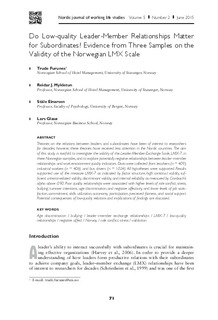| dc.contributor.author | Furnes, Trude | |
| dc.contributor.author | Mykletun, Reidar | |
| dc.contributor.author | Einarsen, Ståle | |
| dc.contributor.author | Glasø, Lars | |
| dc.date.accessioned | 2016-08-31T09:22:15Z | |
| dc.date.available | 2016-08-31T09:22:15Z | |
| dc.date.issued | 2015-06 | |
| dc.identifier.citation | Furnes, T. et al. (2015) Do low-quality leader-member relationships matter for subordinates? Evidence from three samples on the validity of the Norwegian LMX scale. Nordic journal of working life studies, 5(2), pp. 71-87 | nb_NO |
| dc.identifier.issn | 2245-0157 | |
| dc.identifier.uri | http://hdl.handle.net/11250/2403059 | |
| dc.description | This is an open access article published under a CreativeCommons license CC-BY-NC-ND 4.0. It was originally published in the Nordic Journal of Working Life Studies. | nb_NO |
| dc.description.abstract | Theories on the relations between leaders and subordinates have been of interest to researchers
for decades; however, these theories have received less attention in the Nordic countries. The aim
of this study is twofold: to investigate the validity of the Leader-Member-Exchange Scale, LMX-7, in
three Norwegian samples, and to explore potentially negative relationships between leader–member
relationships and work-environment quality indicators. Data were collected from teachers (n = 409),
industrial workers (n = 406), and bus drivers (n = 1024). All hypotheses were supported. Results
supported use of the measure LMX-7 as indicated by factor structure, high construct validity, sufficient
criterion-related validity, discriminant validity, and internal reliability as measured by Cronbach’s
alpha above 0.90. Poor quality relationships were associated with higher levels of role conflict, stress,
bullying, turnover intentions, age discrimination, and negative affectivity, and lower levels of job satisfaction,
commitment, skills utilization, autonomy, participation, perceived fairness, and social support.
Potential consequences of low-quality relations and implications of findings are discussed. | nb_NO |
| dc.language.iso | eng | nb_NO |
| dc.publisher | Roskilde University | nb_NO |
| dc.rights | Navngivelse-Ikkekommersiell-IngenBearbeidelse 3.0 Norge | * |
| dc.rights.uri | http://creativecommons.org/licenses/by-nc-nd/3.0/no/ | * |
| dc.subject | ledelse | nb_NO |
| dc.subject | aldersdiskriminering | nb_NO |
| dc.subject | arbeidsliv | nb_NO |
| dc.subject | mobbing | nb_NO |
| dc.subject | LMX-7 | nb_NO |
| dc.subject | low-quality relationships | nb_NO |
| dc.subject | rollekonflikt | nb_NO |
| dc.subject | stress | nb_NO |
| dc.subject | validation | nb_NO |
| dc.subject | working conditions | nb_NO |
| dc.subject | management | nb_NO |
| dc.title | Do low-quality leader-member relationships matter for subordinates? Evidence from three samples on the validity of the Norwegian LMX scale | nb_NO |
| dc.type | Journal article | nb_NO |
| dc.type | Peer reviewed | nb_NO |
| dc.subject.nsi | VDP::Social science: 200::Economics: 210::Business: 213 | nb_NO |
| dc.source.pagenumber | 71-87 | nb_NO |
| dc.source.volume | 5 | nb_NO |
| dc.source.journal | Nordic journal of working life studies | nb_NO |
| dc.source.issue | 2 | nb_NO |

